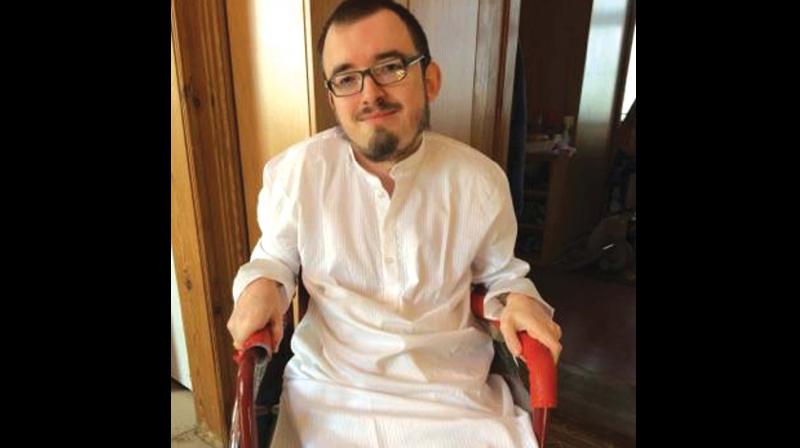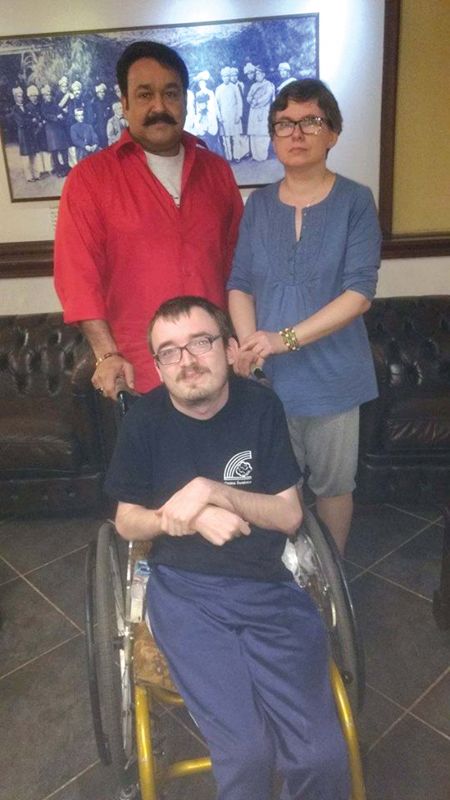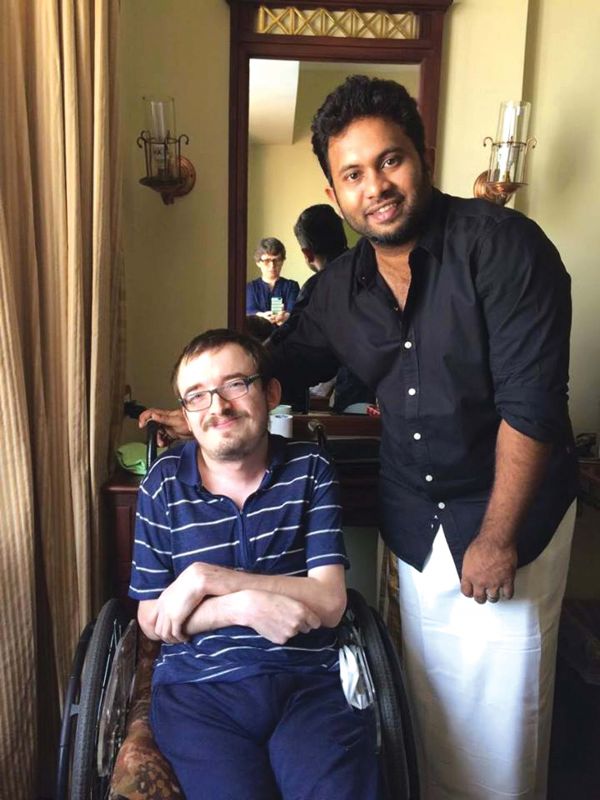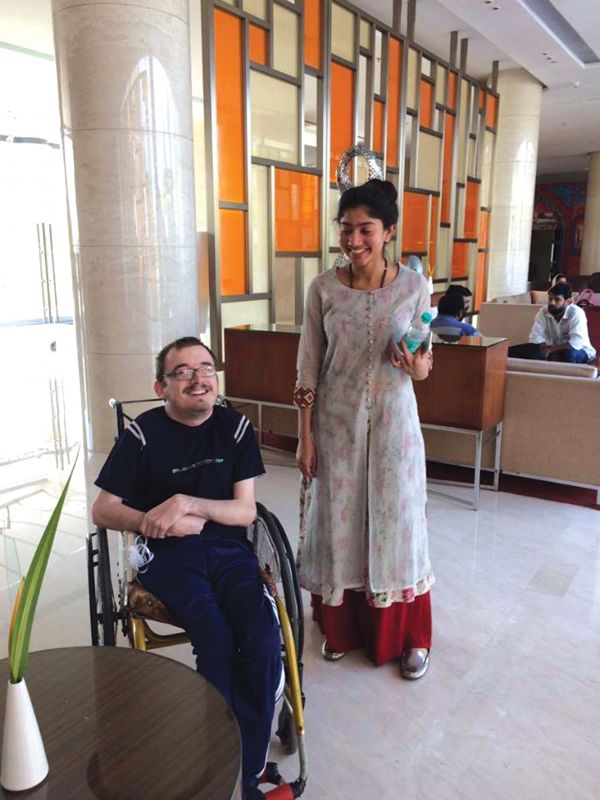A Polish admirer in Mollywood
Bartosz Czarnotta's reviews of Malayalam films have many takers online.

Poland, for all Malayalees, is a word that brings a wide grin to their faces, thanks to the famous question Polandil enthu sambhavichu? (What happened in Poland?) from the movie Sandesham. Likewise, for Bartosz Czarnotta, a Pole, Malayalam is a word that makes him happy. “Keralite by heart” is how this cinephile describes himself. A specialist in south Indian movies, especially Malayalam, Czarnotta writes film reviews on the Malayalam movies he watches and has quite a huge fan base on social media. From Prem Nazir to Nivin Pauly, MGR to Vijay Sethupathi, Czarnotta knows every actor and posts birthday messages for them on his Facebook wall. He is so much in love with Malayalam that despite being bound to a wheelchair due to cerebral palsy, he has flown to Kochi twice — in December 2015 and January this year — along with his mother.
Talking about how it all began, Czarnotta says, “Five years ago, I faced some personal issues and it was MGR who came to my rescue! I immersed myself in Tamil cinema. Its complex links with politics and MGR’s larger-than-life persona helped me overcome the crisis.” Always on his desk is a photograph of his hero — MGR. His tryst with Malayalam happened through MGR, whose biographical movie Iruvar introduced him to Mohanlal. “Lalettan blew me away with his performance as Anandan. The first Malayalam movie I watched was Pranayam. Then came Namukku Parkkan Munthirithoppukal, Dasaratham and so on,” says the young Pole, who also got the opportunity to enjoy the actor’s hospitality in Kochi. “I was lucky to meet Lalettan twice. He is so simple, caring, gentle and easy to talk. He covered the cost of my stay at Travancore Court during my first visit,” he says.
But Czarnotta doesn’t want to be branded as a Mohanlal fan. “I love Mammookka too. I am not comfortable with being framed as just a Lalettan fan, especially in the context of well-known fan fights over the legends,” he adds. Though he met several actors, directors and technicians during his Kerala stay, his visits had another purpose too. “I am trying to promote Malayalam and to some extent, Tamil movies, in Poland. Till now, I have organised three university screenings of movies — Maheshinte Prathikaram at Jagiellonian University in Kraków, Tamil movie Uriyadi at Wroclaw University and Angamaly Diaries in Warsaw.”
The response was very positive, especially from students, but there is a long way to go. “I am collaborating with some distributors of Malayalam and Tamil movies in Europe and I am trying to facilitate their operations in Poland. Though there is a market for Malayalam movies, the beginning is full of challenges and struggles. Malayalam movies are not known much even among Polish diplomats who have contacts in Bollywood,” he rues. He is also happy that Polish movies are well-received in Kerala. “I am aware that three Polish movies were screened at the recent edition of IFFK. From time to time, I get requests from friends to recommend good Polish movies. So I can smell that, if marketed well enough, Polish movies would find a place in Kerala theatres quite easily,” he says hopefully.
Apart from reviewing movies in the English language, Czarnotta pens poems in Polish too. Two of his works have been published. But he hasn’t found many Polish translations of Malayalam literature. “A vast majority of Polish academic-driven indology is about north and west India. So there are very few translations, I suppose,” he says. However, he has read English versions of many works like Kamala Das’s My Story. Translation is a barrier for him when it comes to movies too. “Lack of proper subtitles is a serious issue. That’s why I miss many old movies. But it is improving,” Czarnotta feels. His favourite picks from the recent past are Drishyam, Maheshinte Prathikaram and Munnariyippu as well as Joker in Tamil.
He is also aware of the famous phrase Polandine patti oraksharam mindaruth (Not a word about Poland), though he hasn’t been able to watch Sandesham fully for lack of subtitles. Poland, for Kerala, is the country that witnessed the fall of the 40-year-old Communist regime. “Interestingly, in Polish political mindset, Keralites’ attachment to Communism is widely considered as strange and even shocking. In contemporary Poland, there is very little space for Left-leaning politics,” he observes.
Most of his film reviews lack harsh criticism. Is it part of his soft nature? “I am criticised for that, though avoiding harsh attitude is part of my character. But check my review of Pulimurugan or Kabali. I am not always soft. I am just being honest with my reviews,” he states, adding that he also watches Polish movies. Czarnotta’s Polish write-up about the poetic impressions in Mammootty-starrer Varsham resulted in many of his Polish friends watching the movie. He has a lot more to do. “I am trying to bring Sunday Holiday and possibly Richie to Poland. The main problem is that most distributors are reluctant to cover the costs of Polish subtitling, which is mandatory for regular screening of foreign movies in most theatres here. Subtitles will increase viewership,” he feels.
Czarnotta regrets not being able to meet Mammootty while in Kerala. “I tried to meet Mammookka twice. In 2015, he was unwell and the last time, he was away when I was in Kerala and returned only on the day I left,” he says, adding he is glad that Dulquer Salman commented on his review of Charlie. Winding up the conversation, Czarnotta says he can feel how much people love the big M’s. He states, “The immense love Keralites have for Lalettan and Mammookka is something really special. This should be analysed and described in depth, also in a scientific context. I am touched when I experience again and again their profound significance in the collective identity of Kerala.”



